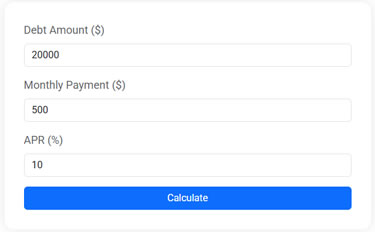Debt Relief Options: Exploring Your Path to Financial Freedom

Budgeting plays a vital role in achieving debt relief and financial freedom by helping you track income and expenses, prioritize debt repayment, and avoid accruing more debt. To create an effective budget, list all income sources, categorize expenses, and set SMART financial goals, while employing practical tips like using cash envelopes and automating payments to stick to your plan. If debt becomes overwhelming, consider seeking professional help from credit counseling agencies or debt relief companies, but proceed with caution to avoid scams.
Debt can feel like a heavy backpack you can't take off, dragging you down and making every step forward a little harder. Whether it's credit card balances, student loans, or unexpected medical bills, many people find themselves navigating the complicated world of debt. But here’s the good news: there are paths to financial freedom that can lighten your load, and they don't always require drastic measures. A thoughtful approach to budgeting and understanding your debt relief options can make all the difference. Imagine having a plan that not only helps you manage your current situation but also sets the stage for a brighter financial future.
Getting out of debt isn't just about paying bills until you finally see a zero balance. It's about creating a sustainable lifestyle that prevents debt from creeping back in. This journey requires a mix of discipline, strategy, and sometimes a little help from the professionals. Whether you’re just starting to tackle your debt or need guidance after trying on your own, this article will walk you through the essential steps to reclaiming your financial freedom.
The Role of Budgeting in Debt Relief
At the heart of any successful debt relief strategy is a solid budget. Budgeting isn't just a tedious exercise; it's a powerful tool that gives you a clear picture of your finances. By organizing your income and expenses, you can identify where your money is going and where you can cut back. This clarity is crucial for prioritizing debt repayment and preventing new debt. For example, Nate, who shared his story on a popular finance podcast, was able to pay off $50,000 of debt in three years by meticulously tracking his spending and making thoughtful adjustments.
Creating a budget that works for you involves listing all your income sources and categorizing your expenses. You might find that your morning coffee habit is costing more than you thought, or that subscription services are quietly draining your funds. By having everything laid out, you can make informed decisions about what expenses are essential and what can be trimmed or eliminated. This approach not only helps with debt but also ensures you have more control over your financial future.
Budgeting isn't just about cutting back. It's also about setting achievable financial goals. These goals should be SMART: Specific, Measurable, Achievable, Relevant, and Time-bound. For instance, if your goal is to pay off $10,000 in credit card debt, you might decide to allocate an extra $500 per month to your payments. This goal is specific and measurable, and by setting a timeline, you keep yourself accountable.
As you build your budget, consider using practical tips to help you stay on track. Many people find success with the cash envelope system, which involves allocating a set amount of cash to different categories of spending. Once the cash is gone, you stop spending in that category. Additionally, automating bill payments ensures you never miss a due date, avoiding late fees and keeping your credit score intact. These small habits can make a big difference over time.
When to Seek Professional Help
Despite the best budgeting efforts, there may come a time when debt feels overwhelming. If you're struggling to keep up with minimum payments, dealing with constant creditor calls, or facing potential legal action, it might be time to seek professional assistance. Credit counseling agencies and debt relief companies offer services that can provide a much-needed lifeline.
Credit counseling agencies are typically nonprofit organizations that offer free or low-cost advice. They can help you create a manageable budget and may negotiate with creditors to lower interest rates or waive fees. As noted by the National Foundation for Credit Counseling, these organizations can help you understand your options without pushing you into a one-size-fits-all solution.
Debt relief companies, on the other hand, often promise to settle your debts for less than what you owe. While this can be an appealing option, it comes with risks. Debt settlement can negatively impact your credit score, and some companies charge hefty fees while failing to deliver on their promises. According to the Federal Trade Commission, it's crucial to research and choose a reputable company to avoid scams.
If you decide to work with a professional, ensure you understand the terms and conditions. Ask for recommendations, read reviews, and verify their accreditation with organizations like the Better Business Bureau. A little due diligence can protect you from falling victim to fraud and set you on a path to genuine debt relief.
Debt Payoff Calculator
Plan your financial future by estimating how long it will take to pay off your debt based on your balance, annual percentage rate (APR), and monthly payment. After entering your figures, the calculator determines the number of months needed to fully repay the debt and calculates the total interest paid over time.
Exploring Different Debt Relief Options
Several debt relief options can help you tackle your financial burdens, each with its own pros and cons. Debt consolidation is a popular choice, especially for those with multiple high-interest debts. This involves taking out a single loan to pay off all your existing debts, leaving you with one monthly payment at a potentially lower interest rate. However, it's important to ensure the consolidation loan doesn't just extend the repayment period without reducing total costs.
Another option is a debt management plan (DMP), typically offered by credit counseling agencies. With a DMP, you make a single monthly payment to the agency, which then disperses it to your creditors. This can simplify your payments and might lead to reduced interest rates, but be prepared for a plan that can span several years and may require closing credit card accounts.
For those facing significant financial hardship, bankruptcy might be considered a last resort. While it can provide a fresh start, the impact on your credit can be severe and long-lasting. It's essential to weigh the pros and cons and possibly seek legal advice to understand the implications fully.
Each debt relief option has its nuances, and what works for one person might not suit another. Take the time to research, seek advice, and choose a path that aligns with your financial goals and circumstances.
Staying Committed to Financial Freedom
Once you've chosen your path and started your journey to debt relief, staying committed is key. It's easy to feel discouraged, especially when progress seems slow, but remember that every step forward is a step toward freedom. Celebrate small victories, like paying off a single credit card or sticking to your budget for a month, as these milestones keep you motivated.
Financial literacy can also play a significant role in maintaining momentum. Educate yourself about personal finance topics, such as investing, saving for retirement, and understanding credit scores. As financial educator Dave Ramsey often emphasizes, knowledge is power, and the more you know, the better equipped you'll be to make smart financial decisions.
Finally, don't underestimate the power of community. Whether it's joining a support group, participating in online forums, or simply talking with friends and family, sharing your journey can provide encouragement and accountability. You're not alone, and there are countless others who have walked this path and come out stronger on the other side.
In conclusion, achieving financial freedom is a journey that requires patience, planning, and sometimes professional help. By understanding your debt relief options and creating a realistic budget, you can take control of your finances and work toward a debt-free future. Remember, it's not just about numbers on a page; it's about creating a life where money doesn't dictate your choices. With the right tools and mindset, you can leave the weight of debt behind and move confidently toward a brighter financial horizon.








